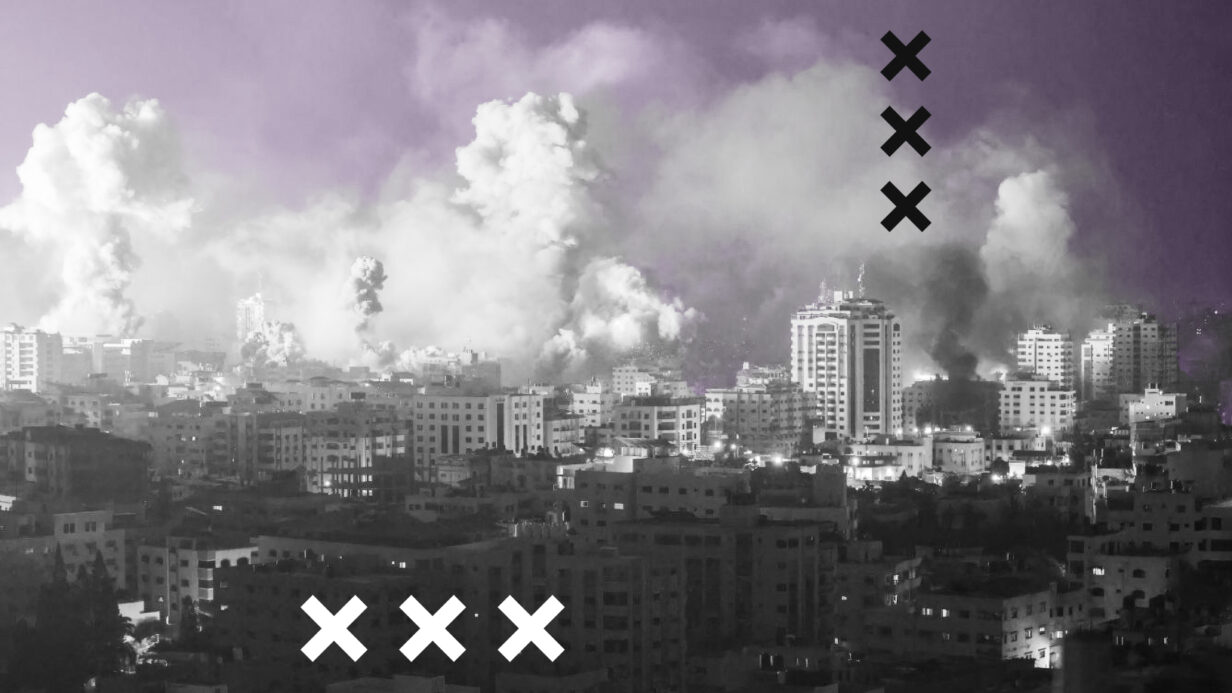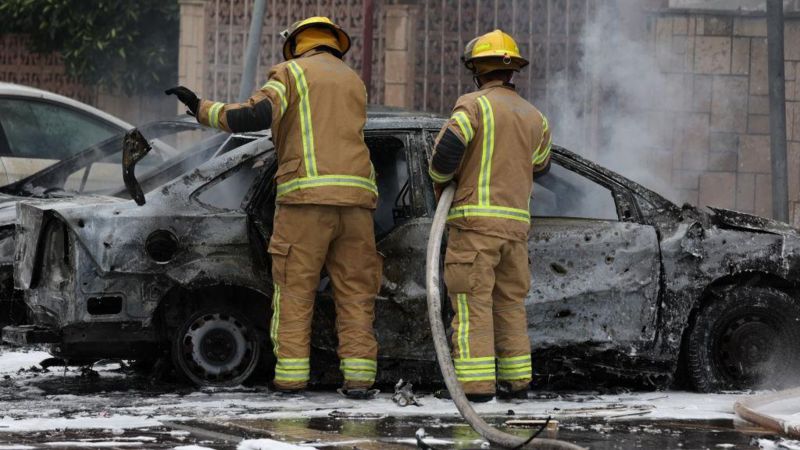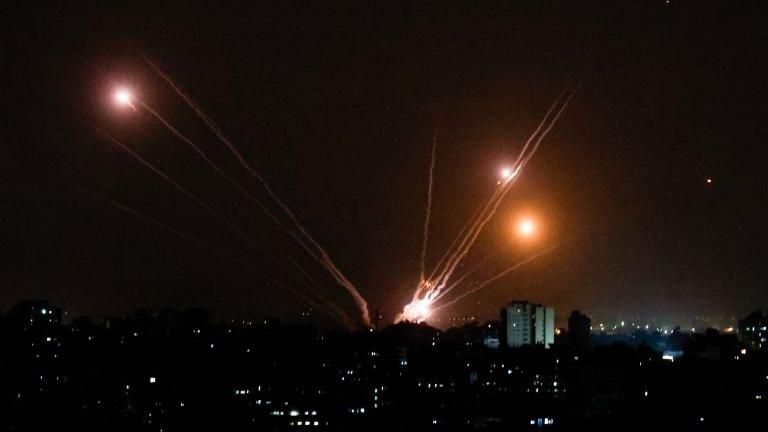
How do the events of October, 7 differ from the previous Israeli-Palestinian conflicts? Why was Israel unprepared for the invasion? What could happen to the hostages? A new configuration of the relations between Palestine and Israel emerges, says Dmitry Mariasis, candidate of economic sciences, specialist on the Middle East, former head of the department of the Israel study and Jewish communities at the Institute of Oriental Studies of the Russian Academy of Sciences.

Dmitry Mariasis
In the last few days, in addition to rockets, machine gun fire, sirens and deaths, the residents of Israel have been bombarded with a huge flow of information about what is happening around them. Horror riveted those who did not go to the front to news feeds and footage from the scene. Dozens of questions are swarming in my head. Most of them will only be truly answered after the war is over. We will most likely never get answers to some of them. However, this does not mean that they do not need to be formulated.
Causes of the start of the war
Hamas says the attack was caused by the behavior of Jewish Israelis on the Temple Mount in Jerusalem – disrespectful actions towards the Al-Aqsa Mosque. It seems that this was, at best, a pretext. Why? If only because a few weeks before the start of hostilities the Israeli Hebrew-language press wrote about several meetings of the leaders of terrorist organizationsand their agreement to coordinate actions to increase pressure on Israel in the security sphere . It is also impossible not to note the persistent reminder of the Egyptians that ten days before the attack, the head of their intelligence warned the Israelis about the impending attack (the office of the head of government denies this, but why the Egyptians would lie is unclear, but why would the office staff mislead the Israeli population – it is obvious ).
It seems that Hamas made the decision to attack under the influence of several factors, the significance of each of which is now difficult to assess (well, or everyone is free to assess independently). So, firstly, for the leaders of Palestinian organizations (and for Iran, which stands behind Hamas), the process of normalizing relations between Israel and the countries of the Arab East is a big problem. The signing of relevant agreements between the Jewish state and Saudi Arabia may be especially symbolic. In this case, among other things, it becomes obvious that even for a number of leaders of the Islamic world, the Palestinian problem has ceased to be a priority. Simple (and proven) logic told the leaders of the Palestinian movements that Israeli military actions, which are easily presented in the Islamic world as aggression, would at least lead to a freeze in the normalization process, which is what happened.
Secondly, the socio-political processes taking place inside Israel pointed to an obvious split within the country. And the leaders of Iran, and the leaders of the Lebanese Shiite organization Hezbollah, and representatives of Palestinian movements (both official and terrorist) noticed this, noted and “took note of it.” For them, this became an indicator of the weakness of the “Zionist entity.” This means that if this very formation is “strained” even more, it may not withstand the pressure and fall apart.
Thirdly, it is not news that terrorist attacks and any other similar actions are a kind of report on the work done to those who support (financially, technologically, politically) the activities of organizations of such kind. This, in particular, is due to the fact that terrorist organizations usually quickly take responsibility for a particular terrorist attack: “authorship” is important to them.
Fourth, in my opinion, Hamas and other similar organizations need to have time to get rid of accumulated weapons before they are destroyed for any reason, for example, by Israeli aircraft. Therefore, as they accumulate, they should be “effectively” used, that is, used against Israel.
Why was Israel not ready?
Approximately all citizens of the country would like to know the answer to this question. And I would like to believe that, according to the political tradition in Israel, after the end of the war, a special commission will be formed that will most thoroughly examine this horrific failure.
Apparently, already now You can try to look for a purely preliminary answer to this question in the events of the last year. The far-right government of the country, having initiated judicial reform, trying to maximally fulfill coalition agreements with the leaders of religious parties, solving the immediate personal problems of various ministers, quickly managed to drag the country into a powerful social process – a months-long confrontation.
The strength of this phenomenon is such that even such usually apolitical sectors of Israeli society as representatives of business (especially that part of it that is commonly called high-tech) and the army were drawn into it . As a result, the period between the autumn Jewish holidays and Hanukkah (December) was supposed to be the decisive phase of the struggle in all these areas. One potential outcome could be the fall of the current government. For Netanyahu personally and for a number of his associates, this scenario could have extremely unpleasant consequences (at least the end of a political career).
One gets the feeling that the Prime Minister was trying to use the last days of the holiday to simultaneously untie a large number of knots and knots, trying not to cut them. The entire government was involved in the process. The security agenda was played out in Samaria and on the northern border. It was convenient to assume that Hamas was not yet ready to attack. There are a number of arguments in the press for this line of thought, but they all seem to be extremely controversial. For example, the argument that the situation in Gaza has improved because Israel has given more work permits to residents of the enclave. It just seems to me that it is more profitable for Hamas to worsen the situation rather than improve it, since the deterioration of social well-being makes it easier to convince the population of the correctness of its anti-Israel position.
At this stage, the question of how adequately the intelligence worked does not seem fundamental (after the war, this issue should certainly be clarified). After all, as I noted above, the media wrote about the desire of terrorist organizations to carry out some kind of coordinated actions against Israel. Simply increasing vigilance on the Gaza border would have avoided the catastrophe of Saturday morning, October 7th.

Israeli firefighters in Ashkelon. BBC
Terrorist attack VS war
The way I see the situation at this stage can be characterized as follows: Israel itself “brought” the war to itself. In my opinion, Hamas was initially going to demonstrate the growth of its capabilities in the fight against Israel, but its scale did not go beyond the framework of a conventionally standard, albeit large-scale, terrorist attack. Imagine this scenario: militants along the entire length of the border organize simultaneous attacks and meet resistance from the Israel Defense Forces; local skirmishes break out along the entire perimeter, which, coupled with rocket salvoes, creates serious tension for the Israeli security system; as a result, in several places Hamas may be able to break through the border, but by this time the Israeli army is already pulling additional forces to the battle points (the information that the terrorists were with maps of Israeli settlements does not significantly change the picture, but it has not been finally confirmed, besides, now you can get cards very easily); the attack was repulsed, but some of the “heroes” returned to Gaza alive, perhaps even having managed to photograph “trophies” in the form of damaged Israeli equipment; Rocket attacks on Israeli territory continue; the army responds; After some time, negotiations on a ceasefire take place through the mediation of Egypt and Qatar. As a result, Hamas reports that it was able to demonstrate its strength and fighting spirit to the enemy, and the Israeli army and political leadership report that they defended the country.
But the unexpected happened. The militants broke through the border practically without resistance and, inspired by their unexpected success, moved deeper into Israeli territory. Then everyone knows everything. Hundreds of corpses, a huge number of hostages and… And due to the catastrophic nature of the situation, the Israeli government declares a situation of war (for the first time since 1973, a corresponding protocol is being introduced). As a result of everything that has happened, apparently, the Israeli army has no other choice but to radically change the situation in Gaza (it is unlikely that Hamas can be completely destroyed, but it is possible to end their power in the enclave).
This interpretation allows us to overcome several logical dead ends:
a) Why didn’t Hezbollah enter the war? She didn’t mean to. Otherwise I would have joined right away, in the first hour war.
b) Why were they pushed to war, does this provoke Israel to a strong blow? They were not pushed to war. A limited promotion was planned. They did not want to provoke Israel into responding too strongly.
c) Too many hostages. What to do with them? It accidentally happened. This is also a problem for them. Apparently, they will slowly release them. Although the fate of some may be tragic.
Bibi’s manual war and other assumptions
You can often hear the opinion that Netanyahu successfully uses the technique of escalating the Palestinian-Israeli conflict to smooth out internal Israeli social contradictions. There are a number of quite convincing examples of this. But if this had been the case this time, then there would not have been such a failure in combat readiness.
There was an assumption that mercenaries from PMC Wagner participated in the training of militants. In short, they could. But there is no real evidence of this yet.
It has also been suggested that Russia is behind this escalation in order to divert world attention and resources from its own conflict with Ukraine. Despite the fact that now the Russian position on this issue is rather vague and closer to the 1990s (when sympathy for Palestine was much more obvious) than to the 2000s (when there was a noticeably more positive attitude towards Israel), I attribute this to Russia’s current tactical alliance with Iran, rather than a “cover operation” as part of a premeditated plan. It seems to me that the Russian position is too toothless for a thoughtful plan. And the potential arrival of Mahmoud Abbas to Moscow only strengthens this feeling, because the PLO today does not have any influence on Gaza, which means that his arrival in no way demonstrates the influence of the Russian Federation on the situation, but may, rather, serve as an indicator of some confusion.

Hamas continues daily attacks. BBC
What’s next?
This issue has two fundamental dimensions: military and post-war. Let’s start with the military.
Continuation of the war
The longer the confrontation lasts, the less likely it is that Hezbollah or anyone else will join it. The surprise factor is lost. Now it is necessary to take into account the factor of pressure from external players: the USA, the EU, the UN.
Israel will most likely enter Gaza and will remain there until it completely pushes Hamas out of the enclave.
The hostages will be partially handed over to foreign powers, partially recaptured by the Israelis, partially exchanged, and partially (and this is the worst thing) killed.
After the war
A very serious crisis within Israel. There will be enormous pressure on the government to resign. Also, under pressure, as I noted above, it is likely that an investigation will be launched. Very serious social unrest cannot be ruled out. Now the situation looks in such a way that for many, what happened will be a reason to engage in an active search for new meanings in the State of Israel, a new format of ideological and social platforms. There are already signs that for some people close to the right-wing political direction (in the Israeli sense), the blow was stronger than for representatives of the other camp, due to disappointment in the leadership potential of representatives of the ideological movement close to them.
One of the significant issues is the fate of Gaza. It is unlikely that anyone today will be ready for Israel to stay there for a long time, regaining control over the enclave. It seems, no matter how fantastic it may sound now, the most interesting option for Israel may be to fill the emerging power vacuum in Gaza by returning PLO structures there, that is, returning to the situation before the 2007 coup, when Hamas expelled Abbas and his fellow party members from this territory . I repeat that this now looks like a fantastic scenario, and it is not a fact that even if this happens, such a configuration will be stable. But in this case, there will be a short period of time when there will be chances, using the energy of the new reality and the Abraham Accords, to create, for example, an independent Palestinian state.
In any case, to get full answers to these questions, it is necessary that the war ends and Israel survives it.
Text author Dmitry Mariasis